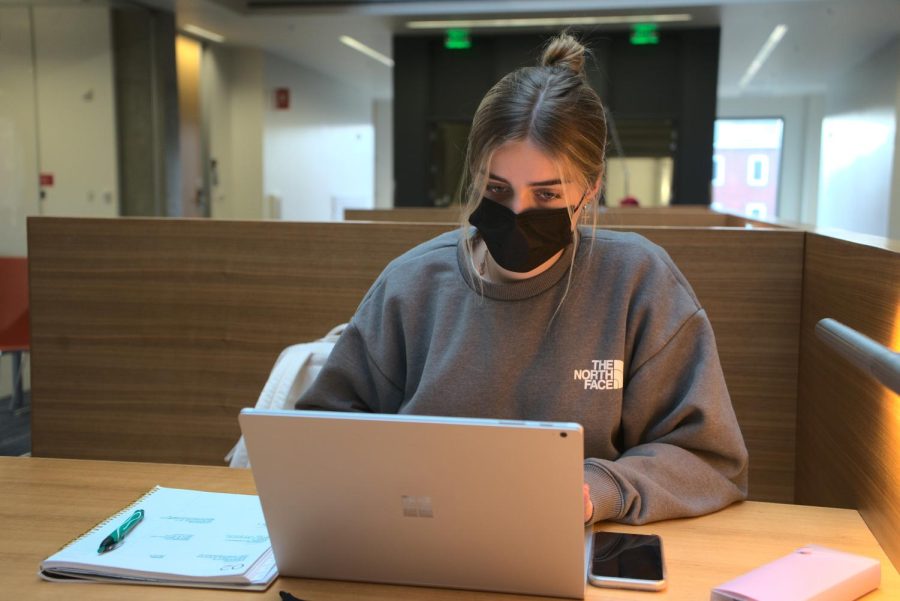F*ck it, real talk: For better or worse, most students cheat in remote-learning education
March 7, 2022
 Editor’s Note: This column does not represent the opinion of The Daily Barometer. This column reflects the personal opinions of the writer.
Editor’s Note: This column does not represent the opinion of The Daily Barometer. This column reflects the personal opinions of the writer.
Many students have admitted to cheating in small ways for their classes, but this low-stakes level of cheating is normal, especially in remote-learning classes.
Remote learning started as just another Zoom class. Students needed the credits, but their classes didn’t help with their degrees, or they were stuck in a class that everyone is required to take, like HHS 231 or COMM. Either way, most students cheated. Not a lot, and not in a way they deemed unnecessary, but nonetheless, most students have been academically dishonest.
Maybe this is because it is easier to cheat in an online class. Really easy. Like, ridiculously, stupidly easy. Maybe it’s because everyone’s mental health plummeted when we were unable to see our friends, go out or travel for over a year. Or maybe it’s because many of us lost loved ones to a pandemic.
I would argue all of these reasons contributed to breaking the norm of academic dishonesty, and when historical norms are broken, they often don’t return.
Not only is it reasonably difficult to cheat in an in-person course, the consequences are also far more apparent. You are face-to-face with instructors and students in a quiet room, where a pin dropping is a deafening cacophony.
There is no statistical evidence to back up that cheating is more prevalent in Ecampus versus in-person courses, but Zoom courses—or remote learning—have been found to feature more cheating than in-person classes. Ecampus has been playing this game for a while, and it’s clear they have a pretty good lock on it.
“We encourage faculty to not to design classes with one or two high stakes assessments, but rather a lot of lower point assignments,” said Shannon Riggs, executive director of academic programs and learning innovation for Oregon State University’s Ecampus program. “If a course has students writing a paper, then the way to approach that would be to have that paper done in stages where there are multiple drafts… Just having to go through that process and show your work along the way can prevent academic dishonesty and it’s just good practice, too, because it’s better learning.”
Considering that OSU’s Ecampus program was recently found to be one of the best in the country, I think it is safe to say that, as far as our education system goes, Ecampus is doing alright. This is likely because Ecampus has had many years to slowly figure out online learning, rather than being rushed into it like most professors were for remote learning.
The big problem here is most professors just took their original, in-person course plans, made a few minor modifications and then threw them online. We were expected to act like students in a classroom while laying in our beds. And because of this, cheating increased—a lot.
When professors put an exam online that is worth 50% of a student’s grade and tell them they aren’t allowed to use the internet, those students won’t listen.
I would argue cheating isn’t as simple as a “No, cheating is bad.” It depends on the class, the material, the test and often mental health. I would also argue that a pandemic that has killed 5.9 million people worldwide so far, not including the mental health effects of isolation, is a pretty massive event, and students deserve perhaps a little slack.
“I think I’ve caught four students cheating on finals,” said Stephen Redfield, senior instructor I of electrical engineering and computer science at OSU. “Catching someone cheating on a final exam, especially remote, that’s tough… If students are taking an unproctored final exam online, how are you going to catch that in the first place? The student would have to be really foolish about how they are cheating to be caught in those circumstances.”
My argument is, like it or not, students cheat. Students cheat now more than ever, and nearly everyone does it because the temptation to cheat, regardless of consequences, is extremely high.
“Ideally you write an exam that does a good job assessing the things you want it to assess,” Redfield said. “Then you must construct the exam in such a way that it is difficult to cheat on, then you have to eliminate any confusing things, present the information in an organized method so students understand what the heck you’re talking about, and then you have to grade the exam.”
It takes a lot of time for instructors to make exams that are difficult to cheat on, but that’s the only real way to stop cheating. But not all cheating is created equal.
“How bad cheating is would depend on what degree of cheating,” said an anonymous student at OSU. “Chegg is a site most have been on to view an answer… I need to know how to do it for the exam so I will learn how to do it by following Chegg. Is it academic dishonesty? Yes. But I view it as more of a resource.”
The vast majority of students interviewed had only cheated on classes not particularly useful for their major, albeit by their own definitions. Most of that cheating was not large-scale, but small-scale cheating on homework. The large events were under no circumstances on classes important to a student’s major.
According to Redfield, he encourages students to come to professors for help before resorting to cheating.
“It sucks to catch people cheating, it really sucks,” Redfield said. “A lot of our teachers here at OSU really care about students. If you approach a teacher and say you are really struggling with this… Say you need help,
just try.”
Students don’t want to cheat, but feel pressured to, and the fact is that most students do, to some degree, cheat. Instead, we need to address the causes. Discipline is not
the answer.
We need to evaluate our education system and ask the hard questions, why do students cheat? And how can we help students? I would argue we need a two-faced approach. Professors need more time to design better tests and classes or, better yet, to remove final exams entirely.
New research suggests that finals don’t evaluate student performance, instead they lead to unnecessary stress for answers that students forget after exams. To fix our education system, we need to design better classes. Students want to learn, but often, there is too much pressure placed on them to do so.
Until next time, safe travels.












































































































